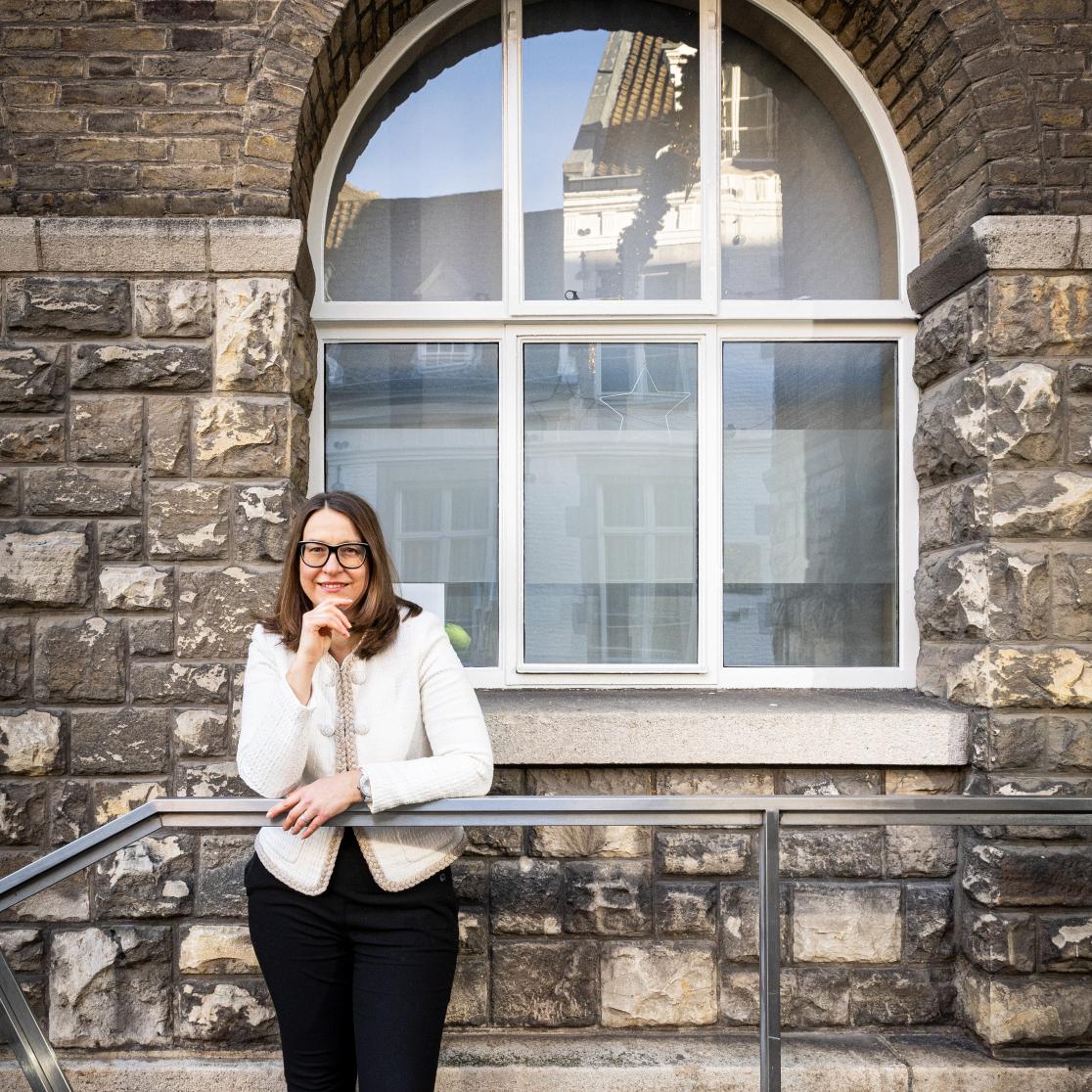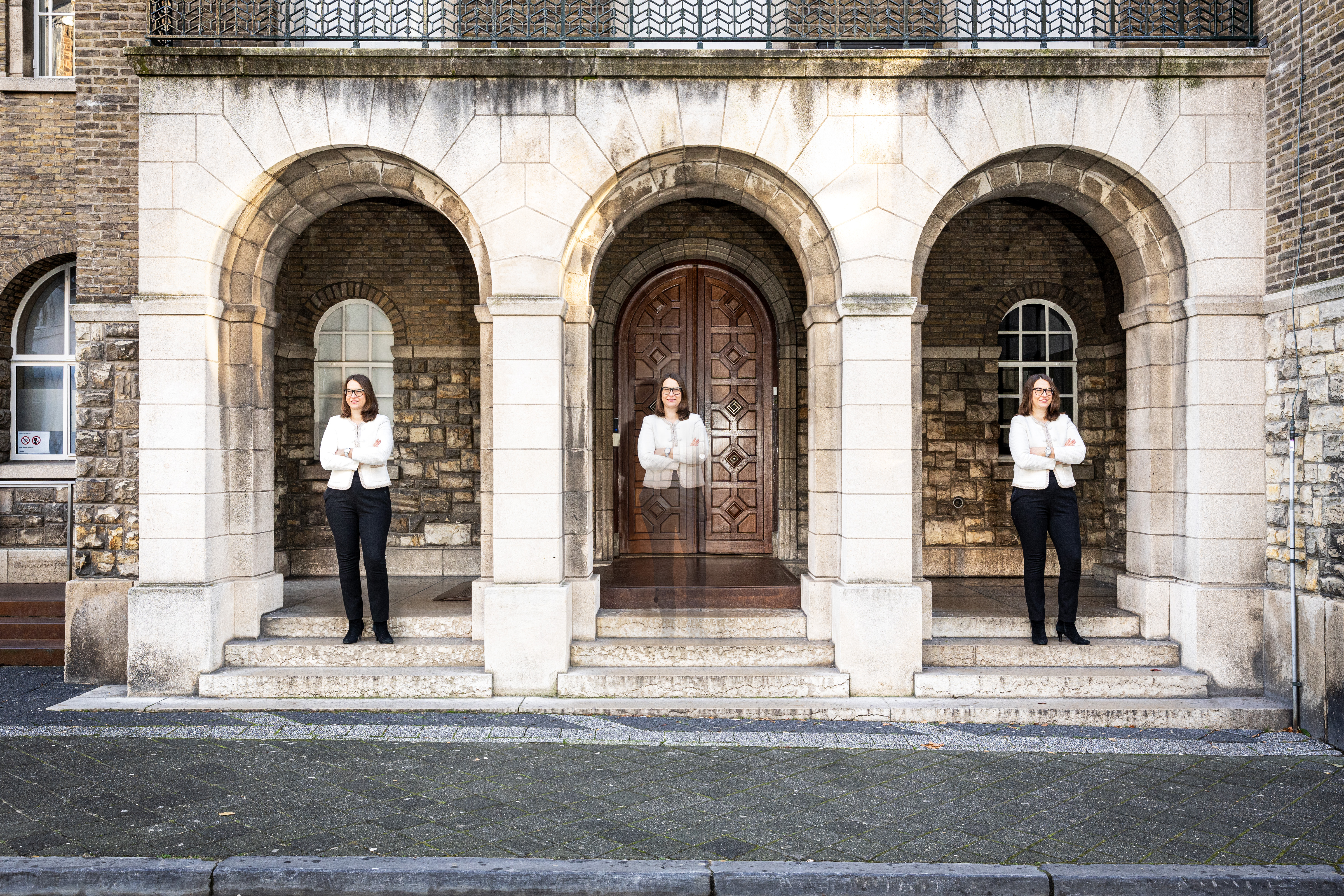The right person
She is “close to AI efficient” in her work, according to her UM colleagues. Maja Brkan, professor of Digitalisation and EU Law, sees the humour in this praise. After living and working in Maastricht for eight years, she moved to Luxembourg to become a judge at the General Court of the European Union. “A lot of big decisions in my life have been intuitive ones, while my work as a judge is the exact opposite.”
Her mother is a professor of English and French, her father a judge. Maja Brkan describes herself professionally as a blend of the two. Born and raised in Slovenia, she wasn’t set on law from a young age. “I also liked economics, and Slovenian language was an option too, because I was very interested in literature and poetry.” After many long discussions with her father in particular—who has “quite good analytical skills”—she opted for law. “And I immediately felt it was the right choice for me. In my first year I attended a seminar on European Law in Copenhagen, and I knew straight away this was the field I wanted to work in for the rest of my life. It was quite intuitive; more something I felt than I could rationalise. Later I had more of those moments. If I feel something is right, I follow that path and it usually turns out to be the right one.”
Sharpening her legal mind
After completing her bachelor’s in Ljubljana, she wanted to broaden her horizons by going abroad for her LLM. “I chose New York University, figuring it might be the only time in my life I could actually live there for a year. It was an intense experience, not only study wise. Culturally, New York has a lot to offer. I often went to the opera—I still recall an impressive Madame Butterfly at the Metropolitan Opera House. And studying at NYU sharpened my legal mind enormously. The approach was different from what I was used to in Slovenia: working on cases, reasoning, weighing arguments. I see Problem-Based Learning in Maastricht as a nice mixture of the more systematic Slovenian system and the skills training I received in the US. Maybe Maastricht was a good fit for me for the same reason.”
PhD in two years
Before moving to Maastricht in 2013, she completed her PhD in two years and spent six years as a legal adviser at the EU Court of Justice. Why the accelerated PhD? “I applied for the position at the Court of Justice while I was working on my PhD and was accepted. I couldn’t let Advocate General Trstenjak wait for me too long, so I worked long hours every day and tried to be as efficient as possible. What helped me was that I had a clear idea of what I wanted to research, and I’d already collected a lot of literature before starting my PhD. I managed to publish a book based on my PhD afterwards, so the quality of the research didn’t suffer. My free time did—but when you’re immersed in writing, you don’t really notice.”
When it was time to move on, Brkan applied to two Dutch universities, including UM. “I’d never been there before my interview and only knew the city from the Maastricht Treaty. So choosing Maastricht was also quite an intuitive decision. My mind wasn’t sure what to do, but my heart knew Maastricht was the right path. It turned out to be a good fit.” Problem-Based Learning and the university’s international, dynamic character suited her perfectly.
Well-prepared
She is grateful for the support she received from UM while she applied to become a judge at the EU General Court. The process took roughly a year and resembled the procedure for applying for a large academic grant. “You have to be qualified and knowledgeable, but you also have to be the right person in the right place at the right time. It depends on so many factors.” Although she enjoyed aspects of the process, such as an intensive hearing by a committee on her knowledge and intellectual capability to reflect, it was occasionally stressful. “I’d been working and studying in this field all my life and I really wanted to pass, but you have to be well-prepared.” In the summer of 2021, she joined the General Court as a judge.
Digging deeper
Being an early riser, she often discusses cases with her cabinet before nine am. “Some cases are challenging because of their scope and sensitive nature. But sometimes a seemingly ‘small’ case can also be difficult to decide, because two decisions are possible. In my experience, judicial decision making is something that ripens over time. If you’re not yet sure how to decide a case, it’s important to take more time, reflect more, dig deeper. You have to wait for that moment when you ‘crack’ the case, to be sure of your decision and not hasten the process.” This is also why she’s sceptical about using artificial intelligence for judicial decision making. “Decisions have to mature, and that involves a lot of thinking, even when you’re not in the office, because then your mind is often fresher and clearer. I like spending time in nature to clear my mind. Or attending a cultural event. But as neither Luxemburg nor Maastricht has an opera house, I haven’t seen much opera lately.”
Avatar Sarah
Brkan was appointed professor of Digitalisation and EU Law at UM in November 2023. In her inaugural lecture, she introduced the audience to “Sarah,” an avatar whose application for an Erasmus exchange scholarship had been rejected based on a decision made by an algorithm. This was Brkan’s segway into the legal aspects of the right to explanation. “Everyone should know that national authorities that use high-risk algorithms for decision making have an obligation to explain such algorithmic decisions, and you always have the right to ask for a human to review the decision. The childcare benefits scandal in the Netherlands is a good example of how this went wrong. As far as I know, the victims were not even aware that an algorithm had been involved in deciding their case. Maybe universities can or should play a role, as part of their valorisation efforts, in educating a broader audience about their rights.”

Virtues
Although she now spends most of her time at the EU General Court, she is pleased that the professorship has renewed her link to UM. “I like to share my knowledge, especially with students. They sometimes ask difficult questions that make you think, just like in the courtroom.”
Combining her work in Luxembourg with her academic duties in Maastricht as well as her private life can be challenging. Fortunately, efficiency is one of her virtues. “That and integrity. Also, I think reflecting on and weighing up different options is something I’ve been doing all my life. I can see an argument from different perspectives, and I’m not stubborn or unable to reconsider my point of view. As a judge, you should listen most to the person you agree with the least. They can make you reinforce your reasoning or even change your mind.”
Her parents taught her to keep her feet on the ground. “When you advance in your career, you get a lot of attention and praise, but in the end it’s all about who you are at your core and how to remain the same person regardless of what you achieve in life. Every human deserves the same respect on that basis alone. I look up to many colleagues as role models, including at UM. Interestingly, they all share two characteristics: they’re intelligent but also humble. That’s what I strive for, too.”
Text Femke Kools
Photography Paul van der Veer

Also read
-
Andrés Caceres Solari on No room for Human Rights in Gaza and Ukraine: How the Law Legitimizes Urban Devastation
Pick Our Brains Session with Andres Caceres Solari

-
AMIBM hosts the final Realise-Bio conference
The Aachen Maastricht Institute of Biobased Materials (AMIBM) hosted last week the third and final Realise-Bio annual conference, bringing together the Dutch and German bioeconomy ecosystems at the Brightlands Chemelot Campus.

-
Macrophages as key to treating liver fibrosis
Sabine Daemen is researching how certain macrophages can slow down fatty liver disease and fibrosis in order to develop new therapies.
